The Asia Pacific Young Workers Forum serves as a platform for young workers and members of Public Services International (below the age of 35) to unite, share experiences, and build solidarity across the region. Recognising the pivotal role that young unionists play in revitalising the trade union movement and continue the fight to keep public services in public hands with more vigour. Therefore building power and capacities of young trade unionists is crucial.
The forum, in discussion with the young unionists from across 4 sub regions aims to set the roadmap for the next five years in strengthen young workers' role in defending public services across Asia Pacific. With its key objectives to enhance the organising capacity of young unionists to build stronger public service unions and increasing the capacity of affiliates to attract and engage young workers into the union movement.
This forum is only for attendees under the age of 35.
Languages: English, Japanese, Korean, Hindi, Thai, Bahasa Indonesia, Nepali and Bangla
A pre-event forum addressing global challenges facing Indigenous communities, focusing on how trade unions can advance Indigenous rights through collective action and solidarity. The session will feature presentations on Indigenous struggles in South Asia and Oceania, with opportunities to build networks and identify future actions.
Indigenous delegates are the participants for this forum. Non-indigenous delegates are highly encouraged to attend as observers
Languages: English and Hindi
Download Resources:
- Agenda.docx
- Slides_Shankar_Limbu_Nepal.ppt
- Slides_Mano Pegu_India.pptx
- Slides_Joanna_Houston_NZPSA.pptx
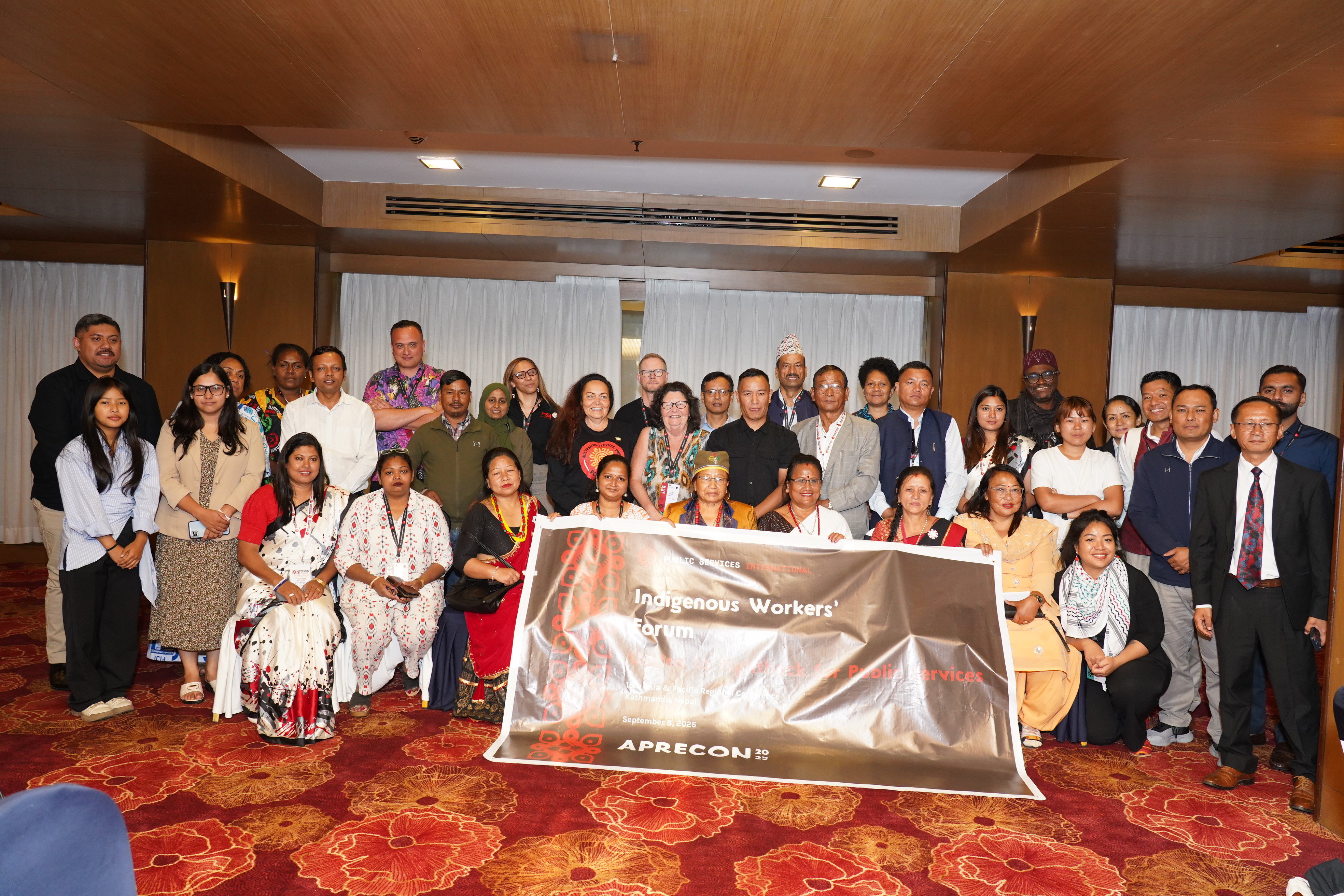
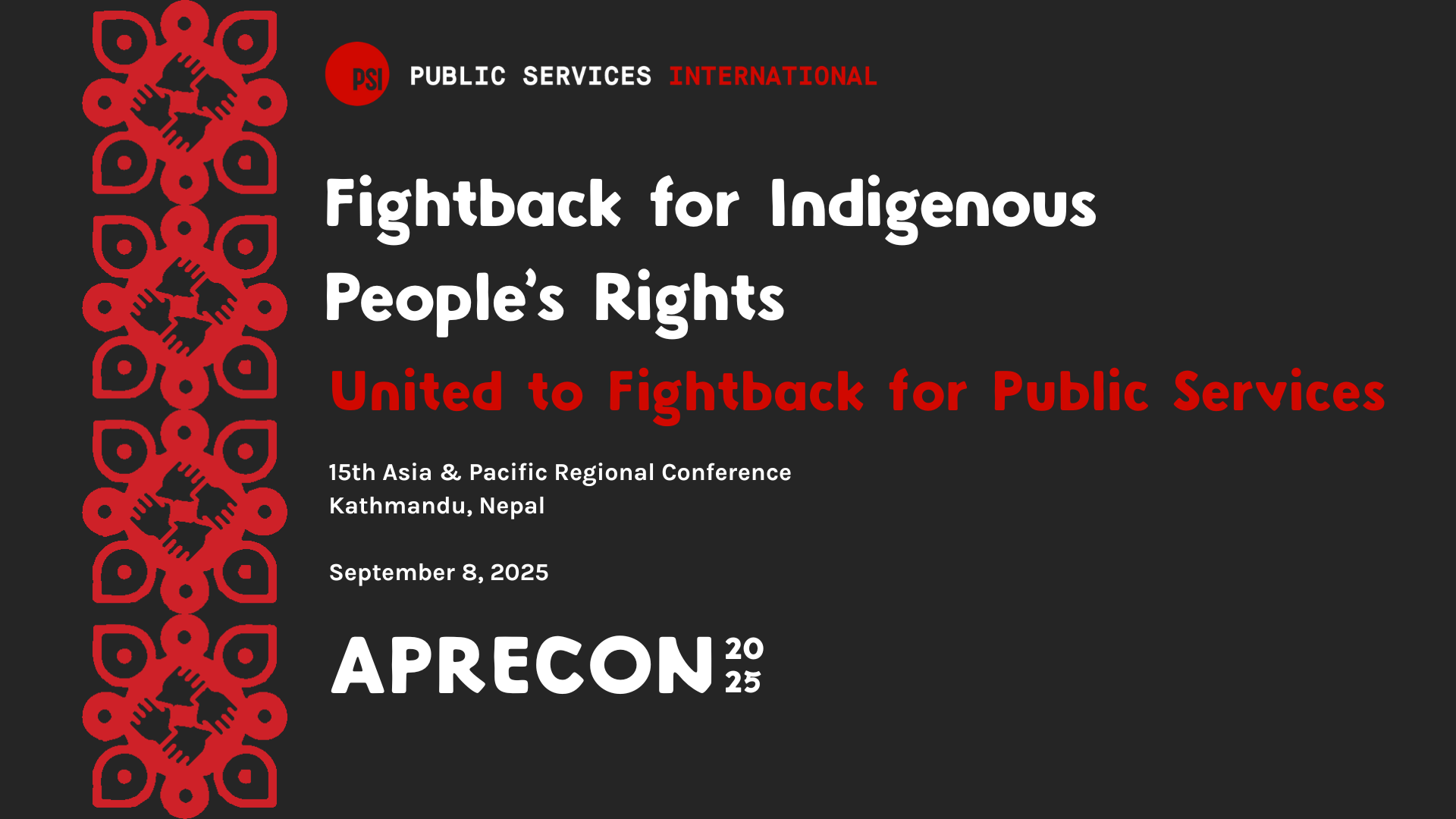
A considerable progress toward equality for LGBT+ workers in some countries is being threatened by a conservative backlash. Elsewhere, LGBT+ people’s lives and relationships are still subject to official harassment and criminalisation. Thus, the union movement has much work to do to address inequality and social exclusion of LGBT+ workers. PSI and public service unions must continue to play a critical role in advancing LGBT+ rights in workplaces, unions, the provision of public services, and society.
In accordance with the Programme of Action (PoA), adopted at the Congress in 2023, the global LGBT+ Coordinating Committee has already been established. Now a regional LGBT+ Coordination Committee needs to be established to lead the regional campaign. While the resource persons and participants will share their experiences in their campaigns, we will also discuss for the establishment of the regional LGBT+ Coordinating Committee.
Languages: English, Japanese and Korean
In modern society, our social and personal lives depend on reliable and affordable energy services. However, according to World Bank 675 million people are without electricity, while 450 million more have unreliable power. That means they don’t have adequate, reliable and affordable for lighting, cooking, heating and other daily activities. Among them, women are the most affected because energy supply is not gender neutral.
The energy sector is responsible for the largest carbon emissions globally, and decarbonisation of electricity systems are a key focus within governments’ climate action plans. This is resulting in a transformation in electricity systems globally, with new renewable energy systems such as solar and wind seeing exponential growth, and new technological models for energy systems being implemented including energy storage and households generating through uptake of small scale solar.The pace and scale of the energy transition is still failing to meet global carbon reduction targets and the situation different between north and south economies.
PSI and its affiliates in the energy sector have long standing opposing privatisation in the energy sector, advocating for public ownership and control of energy resources to ensure just renewable energy transition, affordable and accessible services.
Privatisation of energy will hinder just transition and exacerbate the debt crisis in the Global South. Current policies must be challenged as they are driving energy expansion rather than true transition. For PSI, the only way we can achieve the energy transition we need is through strong public investment, ownership and governance of renewable energy sources.
Languages: English, Japanese, Thai and Bahasa Indonesia
This event is only for young workers (35 years or less).
Building the power and capacities of women trade unionists is crucial for achieving gender equity within the labour movement and the workplace, which in turn strengthens workers' power and solidarity. Women workers often face unique challenges, including pay inequity, gender-based violence and harassment, and the undervaluation of care and invisible work, limiting their participation and leadership. Focusing on the APWOC priorities, the forum will explore strategies towards addressing key issues and support affiliates to identify capacity building requirements and support areas.
All delegates who identify as women are invited as participants and others are welcome to attend as observers
Languages: English, Japanese, Korean, Tamil, Hindi, Urdu, Nepali, Bangla, Thai and Bahasa Indonesia
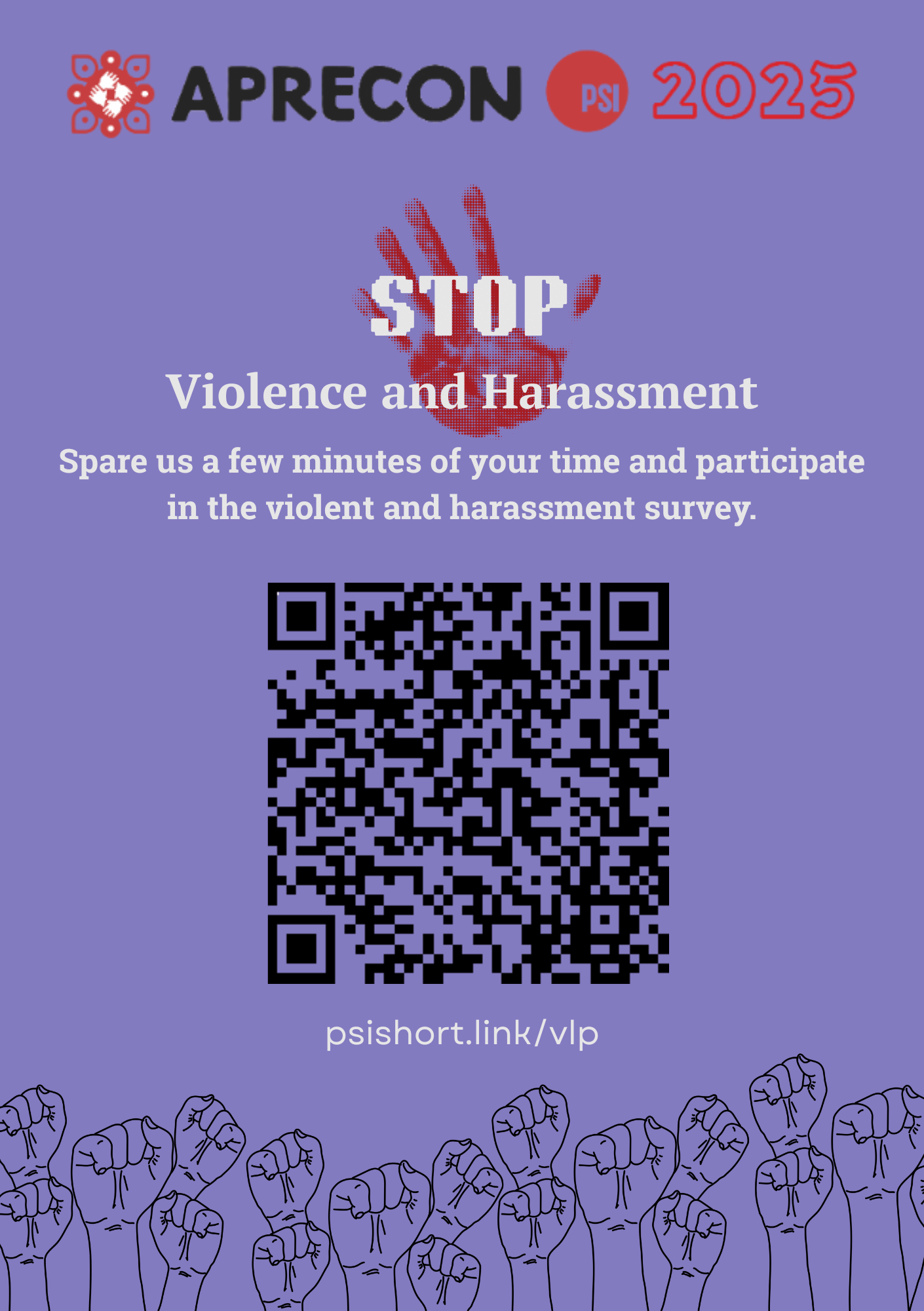
The Asia Pacific Regional Executive Commitee (APREC) is for members only.
Languages: English, Japanese
Languages: English, Japanese, Korean, Tamil, Hindi, Urdu, Nepali, Bangla, Thai and Bahasa Indonesia
(Including Procedural Matters)
Languages: English, Japanese, Korean, Tamil, Hindi, Urdu, Nepali, Bangla, Thai and Bahasa Indonesia
The first thematic panel will address the global and regional threats to quality public services, labour rights and democracy amidst the rise of authoritarianism. Neoliberalism is deeply unpopular; billionaires and Big Tech know this. So instead of continuing support for neoliberal politicians, they have shifted to authoritarianism. This shift, together with the increasing power of Big Tech to monopolise and commercialise data, represents a new and existential threat to democracy, public services, and unions.
Moderated by the prominent journalist from the Hindu newspaper, Ramya Kannan, the panel will include union leaders from the US and Korea who have fought back against repression and discuss the implications of the rise of authoritarian and billionaire power on public services, the climate crisis and democracy.
Languages: English, Japanese, Korean, Tamil, Hindi, Urdu, Nepali, Bangla, Thai and Bahasa Indonesia
Languages: English, Japanese and Korean
Language: English
Languages: English, Japanese and Korean
Languages: English, Thai and Bahasa Indonesia
Language: English
Languages: English and Japanese
For all participants
This event is cancelled due to the ongoing civil unrest and security concerns following the political crisis in Nepal.
A solidarity rally march from Hotel Radisson through Lainchaur and back, bringing together APRECON participants to demonstrate unity and solidarity across the Asia Pacific region.
Assembly: 7:45 AM in front of Hotel Radisson Lazimpat, Kathmandu
Rally Start: 8:00 AM SHARP
Route: Hotel Radisson → Lainchaur → Hotel Radisson (Circular march)
What to Bring: Comfortable shoes, hats, water bottle, light jacket/umbrella, PSI flags, placards with slogans
Languages: English, Japanese, Korean, Tamil, Hindi, Urdu, Nepali, Bangla, Thai and Bahasa Indonesia
The second thematic panel of APRECON will outline the vision for a more just, equitable, sustainable and democratic world. Global rules that evolved over the past 50 years are no longer fit for purpose. The social contract that underpinned the “rules-based order” promised prosperity and the realisation of human rights, including the progressive realisation of economic, social and cultural rights delivered through quality public services. Yet these rules failed to stop runaway global warming, increasing militarism, the global debt crises, gaping inequality or the erosion of democracy.
Panelists will share proposals for pathways to a more just future where quality public services form the basis of sustainable and equitable societies capable of supporting decent work and prosperity. Panelists include perspectives from the acting Minister (adviser) for Finance in Bangladesh, Anis Chowdhury, representative from the UN University International Institute for Global Health, the Young Unionists Forum nominee and affiliates in Oceania fighting for climate justice.
Languages: English, Japanese, Korean, Tamil, Hindi, Urdu, Nepali, Bangla, Thai and Bahasa Indonesia
The Digitalization Workshop is a thematic side event organized to discuss the growing impact of digitalization on labor and public services in the Asia Pacific region. Scheduled for 10 September 2025 in a hybrid format (online and in-person in Kathmandu, Nepal), the workshop will bring together union affiliates to explore how digital technologies—such as platformization and automation—are reshaping work, often to the detriment of workers. It will highlight issues like precarious gig work, the privatization of public services, and the exploitation of labor, particularly among women, in the digital economy.
The two-hour session will feature expert facilitators and include discussions on digitalization’s effects, public procurement, and union strategies like the use of the Digital Bargaining Hub and consequence mapping for advocacy. The workshop aims to build affiliates’ capacity to critically analyze digital trends, defend workers’ rights, and resist exploitative practices. Participants will be encouraged to apply the insights in their local contexts and provide feedback to improve PSI’s digital tools and future initiatives.
Languages: English, Japanese and Hindi
The ‘Fighting privatisation’ Workshop is a thematic side event during APRECON to discuss the growing trend of privatisation in the public services and discuss organising approaches to fight privatisation.
The two hour workshop will have speakers sharing to understand the concept of Insourcing and the policy frameworks to restore public services, sectoral campaigns to fight privatisation, understand the anti privatisation campaign using forensic research. There will be discussion on organising approaches utilised when fighting privatisation.
The workshop expects increased capacity to understand the different campaign models against privatisation and use the tools to fight for Insourcing and Remunicipalisation.
Languages: English, Japanese, Thai and Bahasa Indonesia
The session on migration of health and care workers is part of the parallel workshops on 10 September 2025. It is designed to build a collective understanding on the growing phenomenon of migration of health and care workers from low-and-middle income to high income countries, and the consequences of this on the rights of migrant workers as well as on the existing health systems of the countries of origin. The session aims to encourage affiliates to strategise on interventions and plan support areas towards strengthening the role of trade unions in the processes involved in migration.The agenda includes sharing of findings from a study on migration of health workers from Pacific Islands to countries like Australia and New Zealand, followed by responses from the ILO and trade unions.
Languages: English, Hindi and Nepali
Firefighters are a particular group within Public Emergency Service (PES) workers, who protect people’s lives and property. In many countries in the AP regions, firefighters have no access to freedom of association and collective bargaining. It is a breach of fundamental international labour and human rights. Firefighters face daunting OSH risks and are particularly vulnerable to a wide range of both physical and psychosocial risks.
The Workshop will introduce the ILO Guidelines and other ILO instruments to ensure decent work in PES (Public Emergency Services); share good practice of affiliates on their campaign for firefighters; plan to map PSI affiliates and non-affiliated unions in the AP region, representing firefighters; plan to form a regional firefighters network as part of PSI Global Firefighters Network within regional capacity; and make recommendation to APRECON.
Languages: English and Japanese
Languages: English, Japanese, Tamil, Hindi, Urdu, Nepali, Bangla, Thai and Bahasa Indonesia
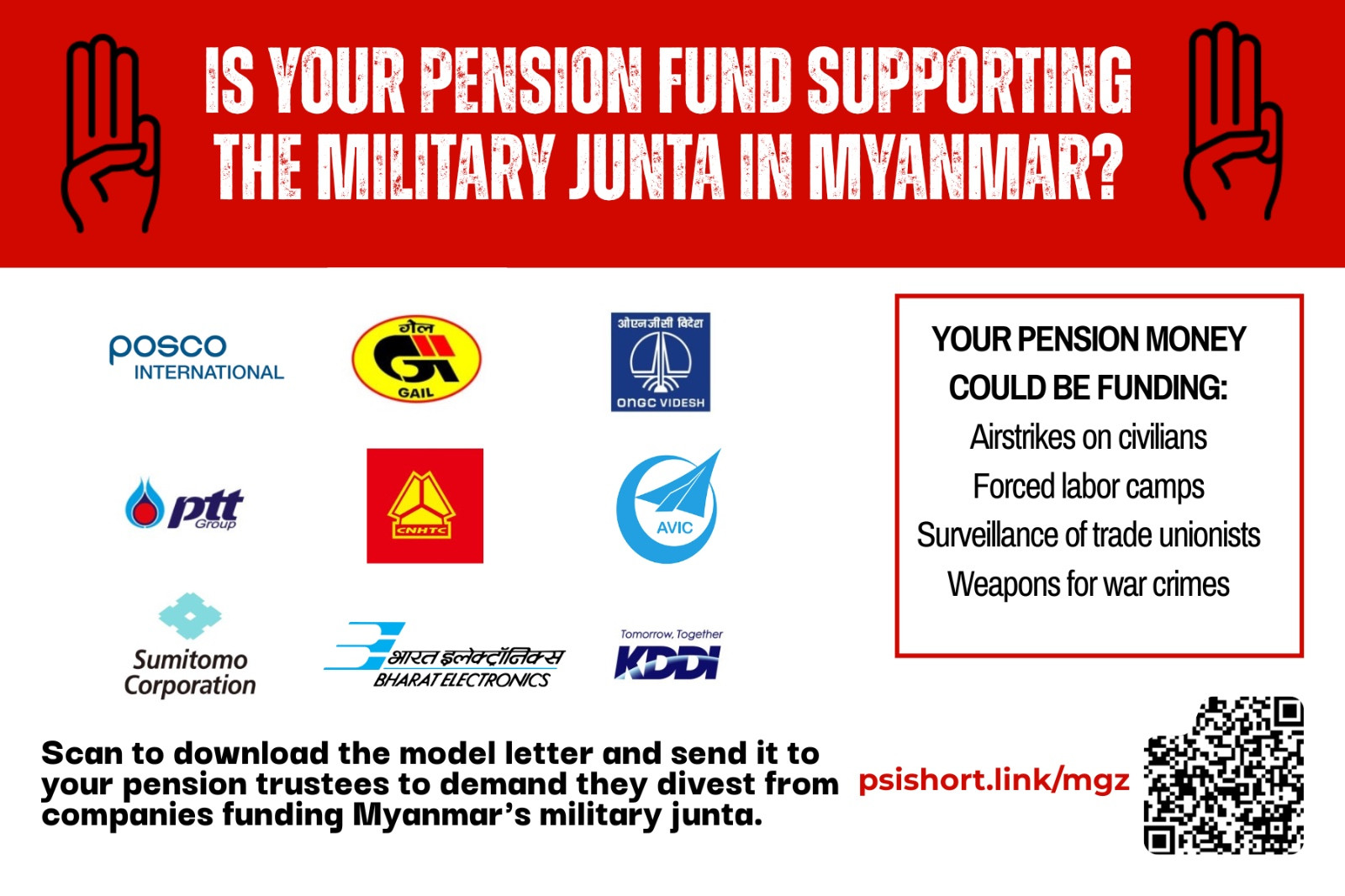
(Only Members)
Languages: English, Japanese, Tamil, Hindi, Urdu, Nepali, Bangla, Thai and Bahasa Indonesia
The ‘Forum on Trade Union’ looks strategically into the regional perspective and how the struggles, challenges and victories of trade union movement especially in the public services help in promoting the protection of the rights of workers through an in-depth analysis and discussions on the trade union rights.
This two-hour forum is designed to invite panelists representing labor sector leaders, academe and the progressive allies from the government to present their respective analysis and perspectives about the state of Trade Union Rights and how their support, sphere of influence and dedicated work help alleviate the current state of workers in the Asia Pacific region and further improve the lives and living conditions of workers and their families.
Public service workers are on the frontlines of the climate crisis. This interactive workshop explores how unions are using bargaining and organising to protect workers and build climate resilience.
Learn from case studies across Australia, Fiji, and South Asia. Take our Climate Justice Bargaining Survey before or during the session. Review survey results from unions across the region and contribute your insights. Launch the Asia-Pacific Climate Bargaining Network.
Open to all delegates.
Languages: English and Nepali
Download Resources:
- Running order_FINAL Climate_Justice.docx
- 1_Slides_EmmaHardy_NSWNMA_Climate.pptx
- 2_Slides_Judith FPSA_Pacific_Climate_Crisis.pptx
- 3_Slides_KinzaMalik_Pakistan_Climate.pptx
- 4_Slides_SungHeeOh_KPTU_GreenCBA.pptx
- CJ barganing survey link poster.pdf
- CJ barganing survey link poster.png
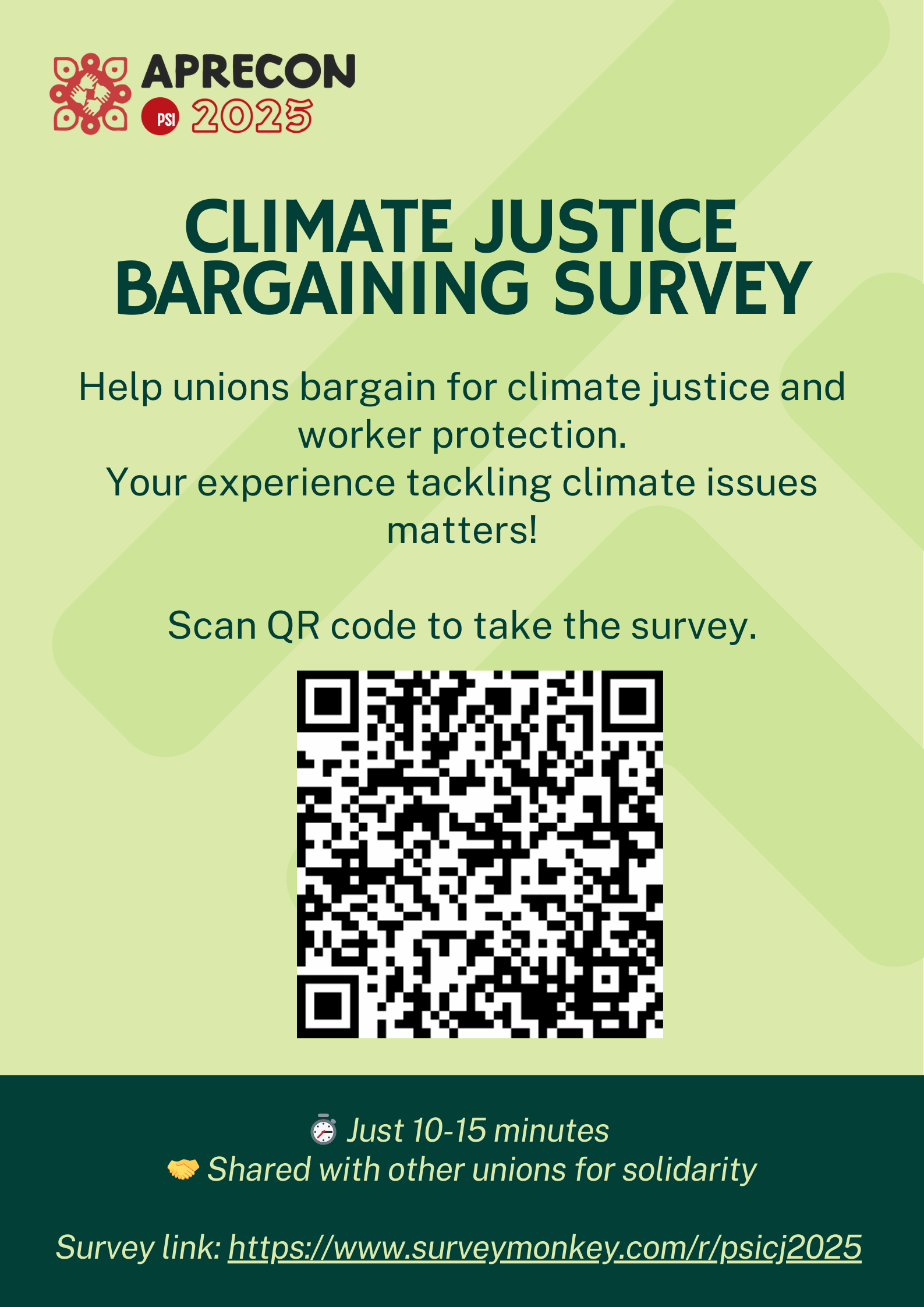
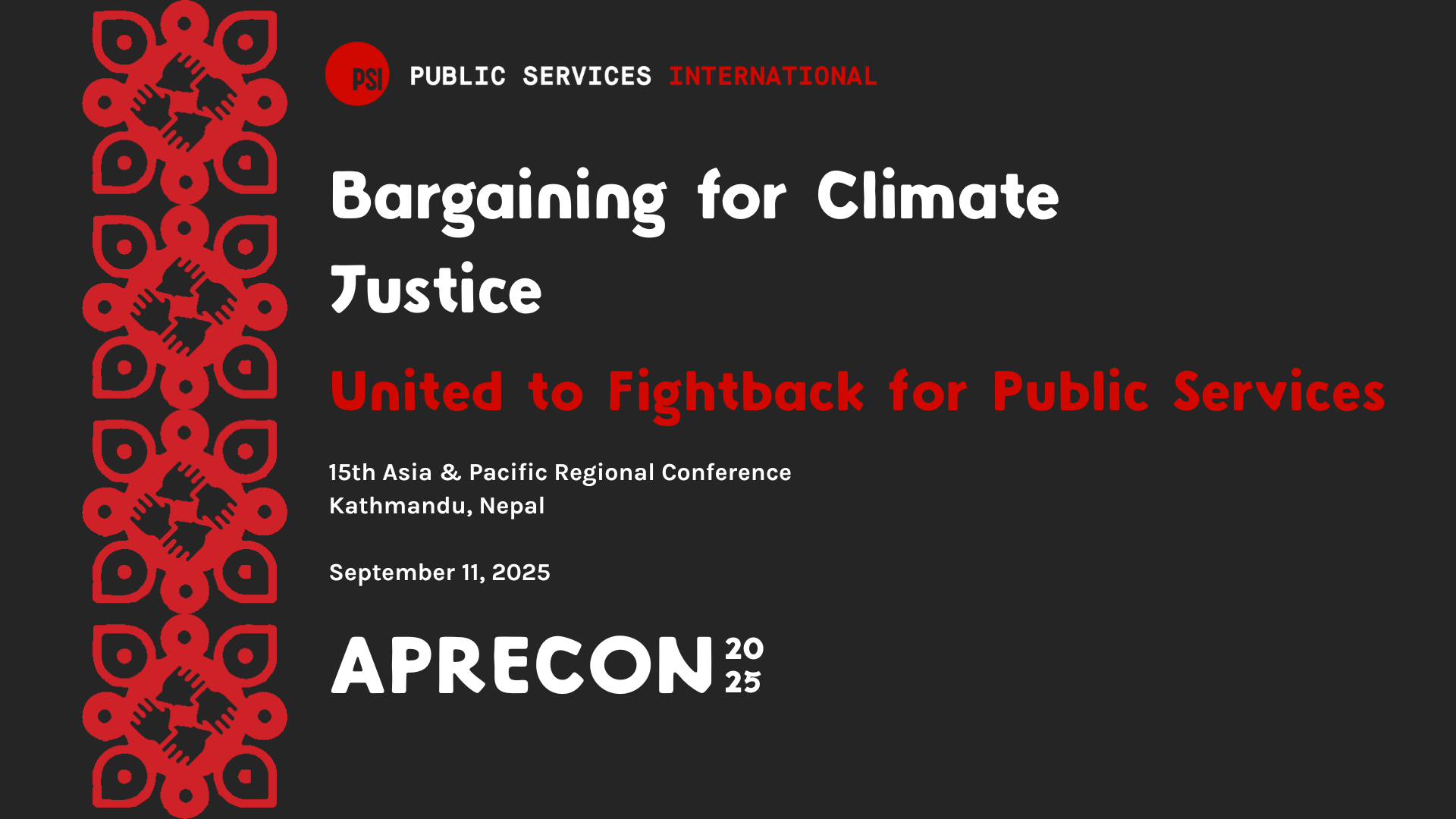
Globally, health systems are under severe strain from underfunding and understaffing, leading to overworked and overstressed staff, declining care quality, reduced worker rights, and increased pressure for privatisation. In the Asia and Pacific region, increased migration of health and care workers from countries with vulnerable health systems exacerbates the issue. Addressing the challenges and fighting back requires not only strengthening trade union power but building a stronger movement by combining forces with allies.This session will explore ways of engaging with global and regional organisations that set policies and guidelines health systems and health workforce. Speakers will include experts and academicians from the sector, who will present on tools and repositories available to trade unions for developing effective campaigns and formulating advocacy strategies.
Languages: English, Japanese, Korean, Hindi and Nepali
The Equalities Workshop titled “Speaking from the Margins” is a thematic side event during APRECON organised to discuss on ways in which public services can be more inclusive. Discussions to build an understanding on ways for inclusion of persons with disabilities in the workplaces as an essential component of social justice and decent work in public services through the guide Trade union guide on Disability Rights that will be presented for the first time at a PSI event. Also voicing young workers from the region on how they are leading the way in winning trade unions rights and how trade unions can play an important role in making public services more inclusive and accessible. The workshop’s goal will be to create a space for young unionists to discuss about this global lurch to the right and thus to strategize, organize, and push back against neoliberal and capitalist structures with a collective youth led agenda and strengthening young workers solidarities in the region.
Languages: English, Hindi and Bahasa Indonesia
The third thematic plenary will explore the successful efforts of unions to win – for workers, for public services, for the climate, and for democracy. Affiliates have always organised, but the polycrisis requires organising and fightback on multiple fronts, using multiple methods. Unions will share their successful organising experiences and consider methods for building on the wins we are having to achieve the vision presented in panel 2.
Languages: English, Japanese, Tamil, Hindi, Urdu, Nepali, Bangla, Thai and Bahasa Indonesia
Languages: English, Japanese, Tamil, Hindi, Urdu, Nepali, Bangla, Thai and Bahasa Indonesia
----
Urgent | The Government Media Office publishes an update on the key statistics of the genocide being carried out by the Israeli occupation against the Gaza Strip for the 700th consecutive day, from Saturday, October 7, 2023, until Saturday, September 6, 2025:
Dr. Jihad Saad Attal. Consultant of the General Union of Health Services Workers - Gaza.
📌 First: Demographic Data and General Context
🔸 Over 2.4 million people in the Gaza Strip are subjected to genocide, starvation, and ethnic cleansing.
🔸 700 days of genocide and ethnic cleansing against civilians in the Gaza Strip.
🔸Approximately 90% of Gaza has been subjected to widespread destruction by the occupation.
🔸More than $68 billion in direct preliminary losses from the genocide.
🔸Over 80% of the Gaza Strip’s territory has been seized through invasion, bombardment, and displacement.
🔸109 times the occupation bombed Al-Mawasi area, which it falsely designated as a “safe humanitarian zone.”
🔸More than 150,000 tons of explosives dropped on the Gaza Strip.
🩸 Second: Martyrs, Missing Persons, and Massacres
🔸 73,731 total martyrs and missing persons since the start of the genocide.
🔸64,300 martyrs received by hospitals since the beginning of the war.
🔸9,500 missing persons, including martyrs still under the rubble or whose fate remains unknown.
🔸Over 20,000 child martyrs, of whom 19,424 reached hospitals.
🔸Over 12,500 female martyrs, of whom 10,138 reached hospitals.
🔸8,990 mothers killed.
🔸22,404 fathers killed.
🔸1,009 infants under one year of age killed.
🔸More than 450 newborns were born and martyred during the genocide.
🔸1,670 medical personnel killed by the Israeli occupation.
🔸139 civil defense personnel killed by the occupation.
🔸248 journalists killed by the occupation.
🔸173 municipal employees killed, including 4 mayors.
🔸Over 780 police officers and aid security personnel killed by the occupation.
🔸 860 sports professionals killed across all sports.
🔸More than 39,000 families subjected to massacres by the occupation.
🔸2,700 families exterminated and erased from the civil registry (8,563 martyrs).
🔸6,020 families exterminated with only one survivor left (12,911 martyrs).
🔸Over 55% of martyrs are children, women, and the elderly.
🔸376 martyrs due to hunger and malnutrition, including 134 children.
🔸23 martyrs due to failed airdrops of aid.
🔸41% of kidney patients lost their lives due to lack of food and healthcare.
🔸Over 12,000 miscarriages due to malnutrition and lack of healthcare.
🔸17 martyrs due to cold in displacement camps, including 14 children.
⚕ Third: Injuries, Arrests, and Humanitarian Conditions
🔸 162,005 wounded who reached hospitals.
🔸19,000 wounded in need of long-term rehabilitation.
🔸Over 4,800 amputations, with children accounting for 18%.
🔸1,200 paralysis cases.
🔸1,200 blindness cases.
🔸429 injured journalists.
🔸6,691 civilians arrested since the beginning of the genocide.
🔸362 medical staff arrested.
🔸48 journalists arrested.
🔸26 civil defense members arrested.
🔸21,182 widows of war (whose husbands were martyred).
🔸56,320 orphaned children (without one or both parents).
🔸Over 2.142 million cases of infectious diseases due to forced displacement.
🔸More than 71,338 cases of hepatitis reported.
🏥 Fourth: The Health Sector
🔸 38 hospitals bombed, destroyed, or put out of service.
🔸96 healthcare centers bombed, destroyed, or rendered nonfunctional.
🔸197 ambulances targeted by the Israeli occupation.
🔸788 attacks on healthcare services (facilities, vehicles, staff, supply chains).
🔸 61 civil defense vehicles (rescue and firefighting) targeted by the occupation.
📚 Fifth: Education and Academic Institutions
🔸 95% of Gaza’s schools sustained physical damage due to bombing and genocide.
🔸 Over 90% of school buildings require reconstruction or major rehabilitation.
🔸 662 schools directly bombed, representing nearly 80% of all schools.
🔸 163 schools, universities, and educational institutions completely destroyed.
🔸388 schools, universities, and educational institutions partially destroyed.
🔸Over 13,500 student martyrs killed by the Israeli occupation.
🔸More than 785,000 students deprived of education by the occupation.
🔸Over 830 teachers and educational staff killed during the war.
🔸More than 193 scientists, academics, and researchers killed during the war.
Languages: English, Japanese and Korea
Languages: English, Japanese and Korea